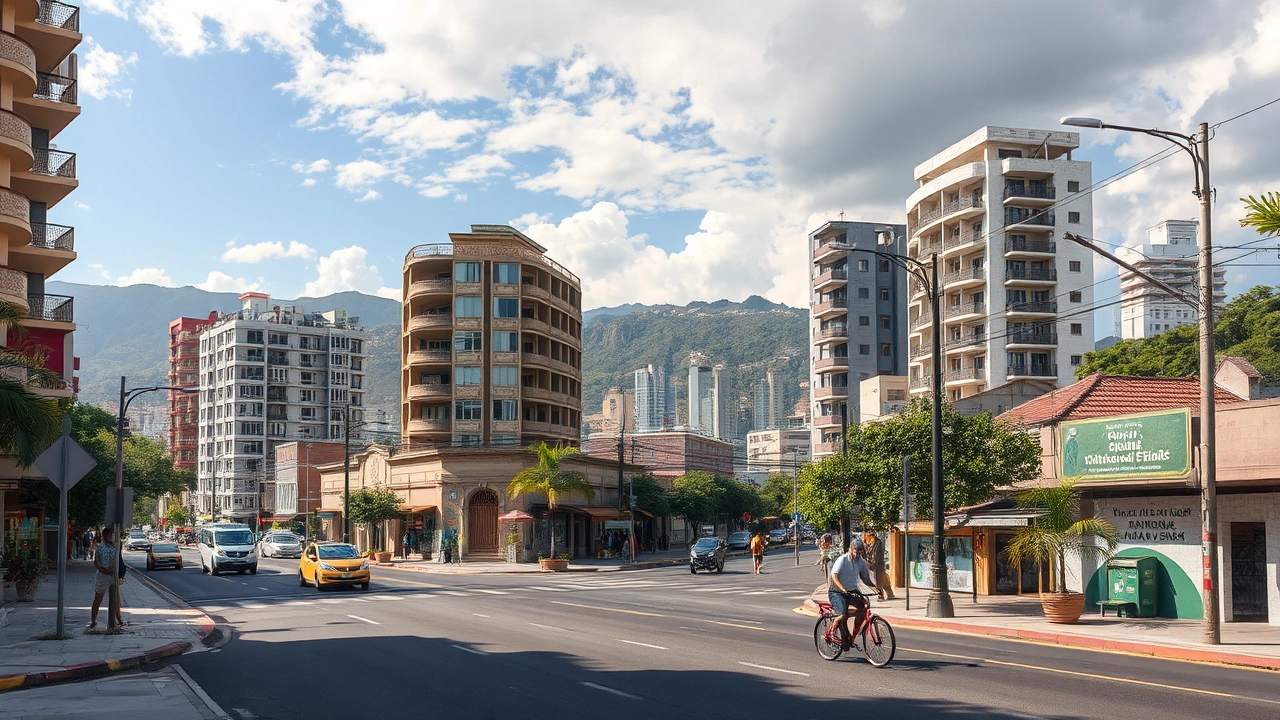
 Published on and written by Cyril Jarnias
Published on and written by Cyril Jarnias
The Island of the Gods isn’t just a haven for tourists seeking exotic experiences—it’s also a land of opportunity for savvy real estate investors. With its pristine beaches, lush rice terraces, and captivating culture, Bali attracts millions of visitors from around the world each year. This steady stream of tourists makes the Indonesian island fertile ground for vacation rentals, offering enticing income prospects for those who know how to navigate the market.
In 2024, Bali welcomed over 6.5 million international tourists, a number that has been steadily increasing since the post-pandemic recovery. This sustained tourism growth fuels robust demand for short-term accommodations, creating a dynamic market for vacation rentals. From luxurious villas in Seminyak to traditional bungalows in Ubud and modern apartments in Canggu, the options are as diverse as travelers’ tastes.
However, embarking on a vacation rental venture in Bali requires a thorough understanding of the local market, current regulations, and best management practices. In this article, we’ll explore the lucrative opportunities this sector offers while guiding you through the nuances of real estate investment on the Island of the Gods.
The Balinese Jackpot: Why Vacation Rentals Are a Dream Investment
Imagine owning a villa with an infinity pool overlooking the Indian Ocean, or a charming bungalow nestled in the heart of the tropical jungle. In Bali, these dreams can become reality and transform into genuine cash machines. Vacation rentals on the island offer significant advantages that are attracting more and more international investors.
First, profitability is guaranteed. With occupancy rates reaching up to 80% during peak season and daily rates ranging from $50 for a simple apartment to over $1,000 for a luxury villa, the generated income can be substantial. Recent studies show that gross rental yields in Bali can range between 8% and 15% per year, significantly surpassing averages seen in many Western metropolitan areas.
Flexibility is another major advantage of vacation rentals in Bali. Unlike long-term leases, you maintain control over your property and can enjoy it personally whenever you wish. This freedom allows you to combine investment with personal pleasure—a compelling argument for many owners dreaming of a tropical second home.
Capital appreciation is also a factor to consider. Despite some fluctuations, the Balinese real estate market has shown a long-term upward trend. Between 2015 and 2024, property prices in sought-after areas like Canggu or Uluwatu saw average annual increases of 5% to 7%, offering interesting potential capital gains upon resale.
Finally, real estate portfolio diversification is a significant advantage. Investing in Bali allows exposure to a dynamic emerging market while benefiting from Indonesia’s relative stability as the world’s fourth most populous country and a G20 member.
Good to Know:
Vacation rentals in Bali can offer gross annual returns ranging from 8% to 15%, with capital appreciation of 5% to 7% per year in the most sought-after areas. Usage flexibility and portfolio diversification are additional advantages for investors.
The Art of Management: Turning Your Property into a Profit Machine
Owning property in Bali is one thing—turning it into a profitable vacation rental business is another. Effective management of your property is key to maximizing your income and ensuring guest satisfaction. Here are some essential strategies for success in this competitive field.
Presentation and marketing of your property are crucial. In a saturated market, your listing must stand out. Invest in professional photos that highlight your property’s assets. Write a detailed and appealing description, emphasizing your property’s unique features and the experiences it offers. Don’t forget to mention local attractions and nearby amenities.
Dynamic pricing is an essential strategy for optimizing your income. Adjust your rates based on seasonality, local events, and demand. For example, during peak season (July-August and December-January), prices can be increased by 30% to 50%. Use market analysis tools like AirDNA or Mashvisor to stay competitive while maximizing your profits.
Guest welcome and customer service are fundamental aspects of vacation rental success. Offer a warm welcome to your guests, either in person or through a local manager. Provide a detailed property guide and recommendations for local activities and restaurants. Responsiveness to requests and potential issues is essential for obtaining good reviews, which are crucial for your online visibility.
Regular maintenance of your property is essential to maintain its value and ensure guest satisfaction. Schedule regular inspections, thorough cleanings between stays, and periodic renovations to keep your property attractive. In Bali’s tropical climate, special attention must be paid to mold prevention and outdoor space maintenance.
Managing bookings and payments can be time-consuming. Consider using all-in-one management platforms like Guesty or Lodgify to automate these processes. These tools can synchronize your calendars across different booking platforms, manage customer communications, and facilitate secure payments.
Finally, seriously consider hiring a specialized local management company. These professionals know the Balinese market inside out and can handle all aspects of management, from guest welcome to property maintenance. Although this represents a cost (typically between 15% and 25% of revenue), it can prove cost-effective in the long run, especially if you don’t reside on-site.
Good to Know:
Effective management of your Bali vacation rental involves targeted marketing, dynamic pricing, impeccable customer service, and regular maintenance. Using automated management tools or hiring a local management company can greatly facilitate these tasks and optimize your income.
Investing in vacation rentals in Bali might seem like an El Dorado, but like any paradise, it has its rules. Understanding and respecting the local regulatory framework is crucial to ensuring the longevity and legality of your business. Here’s a guide to navigating the sometimes murky waters of Balinese regulations.
First, it’s essential to understand that foreigners cannot directly own land in Bali. However, several options are available to work around this restriction. The most common is a long-term lease, or “Hak Pakai,” which allows you to lease land for up to 80 years. Another option is to create an Indonesian company (PT PMA) to purchase the property, although this method is more complex and expensive.
Regulations concerning short-term rentals vary across different regions of Bali. Some areas, particularly in the southern part of the island like Seminyak or Canggu, are stricter and may require specific licenses to operate a vacation rental. It’s crucial to check local regulations before purchasing a property with the intention of renting it out.
Obtaining a business license, or “Pondok Wisata,” is generally necessary to legally operate a vacation rental in Bali. This license, issued by the local government, requires compliance with certain safety and hygiene standards. The process can be lengthy and complex, so it’s recommended to hire a local consultant to guide you through the procedures.
Taxation is a crucial aspect not to overlook. Income generated from vacation rentals is subject to taxation in Indonesia. The tax rate varies depending on income amount but can go up to 30% for the highest brackets. Additionally, a 10% tourist tax is typically applied to the rental price.
It’s important to note that regulations can change quickly. For example, in 2023, the Indonesian government introduced new rules regarding work visas for foreign owners managing their own rentals. Therefore, it’s crucial to stay informed about legislative changes and regularly consult with local experts.
Finally, insurance shouldn’t be overlooked. Ensure you have adequate coverage for your property, including liability insurance for potential damages to guests. Standard insurance policies in Indonesia don’t always cover vacation rental activities, so it may be necessary to purchase specific insurance.
Good to Know:
Vacation rental regulations in Bali are complex and constantly evolving. Key points to remember include the impossibility for foreigners to directly own land, the necessity of obtaining a “Pondok Wisata” business license, and the importance of complying with local tax obligations. Regular consultation with local legal and tax experts is highly recommended.
Vacation Rental Hotspots: Where to Invest in Bali?
Bali offers a diversity of landscapes and atmospheres that appeal to different types of travelers. Choosing the right location for your vacation rental investment is crucial to maximizing your profitability and ensuring high occupancy throughout the year. Here’s an overview of the island’s most promising areas.
Seminyak remains one of Bali’s crown jewels for vacation rentals. This upscale neighborhood attracts affluent clients seeking luxury and sophistication. Villas with private pools are particularly sought after, with rates exceeding $300 per night during peak season. According to AirDNA data, the average occupancy rate in Seminyak reaches 75% annually, with peaks at 90% during high season.
Canggu, once a surfers’ village, has transformed into a trendy hotspot attracting a young and dynamic clientele. Modern apartments and contemporary-designed villas are in high demand. Properties near the beach or popular surf spots like Echo Beach can generate substantial income. The average occupancy rate in Canggu is 70%, with strong demand throughout the year.
Ubud, in the heart of the island, offers a different experience focused on culture and nature. Traditional bungalows and villas with rice field views are particularly appreciated. Although the occupancy rate is slightly lower than in coastal areas (around 65%), rates remain attractive, especially for properties offering an authentic Balinese experience.
For those looking to invest in emerging areas, Uluwatu in the southern Bukit peninsula presents interesting potential. Known for its spectacular cliffs and surf beaches, the region is attracting more and more travelers seeking preserved natural settings. Luxury villas with ocean views can command high rates, although occupancy is more seasonal than in other regions.
Nusa Dua, with its pristine beaches and luxury hotel resorts, attracts family and high-end clientele. Apartments and villas in this secure area can offer stable returns, particularly due to proximity to the airport and quality infrastructure.
It’s important to note that each area has its particularities in terms of regulations and growth potential. For example, Canggu has seen significant real estate price increases in recent years, with an average annual rise of 10% between 2019 and 2024, while areas like Ubud have experienced more moderate but stable growth.
- Seminyak: Luxury and sophistication, high occupancy rate (75% average)
- Canggu: Trendy and dynamic, strong demand year-round (70% occupancy)
- Ubud: Culture and nature, authentic experience (65% occupancy)
- Uluwatu: Emerging, high growth potential
- Nusa Dua: Family-friendly and upscale, stable returns
Good to Know:
Location choice in Bali is crucial for your vacation rental investment success. Seminyak and Canggu offer the highest occupancy rates, while Ubud attracts clients seeking authenticity. Emerging areas like Uluwatu present interesting growth potential for long-term investors.
Maximizing Your Investment: Advanced Strategies for Bali Vacation Rentals
To get the most out of your Bali vacation rental investment, it’s essential to go beyond the basics and adopt advanced strategies. These approaches can help you stand out in a competitive market and optimize your income.
Customer experience personalization is a key differentiator. Create customized packages for different types of travelers. For example, offer a “honeymoon” package including spa services and romantic dinners, or an “adventure” package with organized excursions to volcanoes and temples. According to a 2024 Booking.com study, 72% of travelers are willing to pay more for personalized experiences.
Adopting smart technologies can greatly enhance your property’s appeal. Install home automation systems allowing guests to control lighting, air conditioning, and even property access via their smartphones. These features not only improve guest comfort but can also help you save on energy costs.
Sustainability has become an important selection criterion for many travelers. Invest in eco-friendly solutions like solar panels, rainwater harvesting systems, or biodegradable cleaning products. Highlight these initiatives in your marketing communications. A Booking.com survey reveals that 83% of travelers consider sustainability an important factor in choosing their accommodation.
Diversify your distribution channels to maximize your visibility. Beyond classic platforms like Airbnb or Booking.com, explore more specialized options like Mr & Mrs Smith for luxury or Hostelworld for tighter budgets. Also collaborate with local travel agencies and tour operators specializing in customized Bali trips.
Creating local partnerships can significantly enrich your rental offering. Establish relationships with quality local service providers—drivers, guides, private chefs, yoga instructors—to offer additional services to your clients. Not only does this improve the overall experience, but it can also generate additional income through commissions.
Consider combining short-term and long-term rentals to optimize your income. During low season, offer attractive rates for longer stays (1 to 3 months) targeting digital nomads and retirees. This strategy can ensure stable income throughout the year.
Data analysis is crucial for refining your strategy. Use advanced analytics tools to track booking trends, adjust your rates in real time, and identify improvement opportunities. Platforms like PriceLabs or Beyond Pricing can help you dynamically optimize your rates based on demand.
Finally, invest in continuous training for your local team. Service quality is a determining factor for obtaining positive reviews and loyal customers. Organize regular training sessions on guest welcome, difficult situation management, and Balinese cultural specifics to ensure flawless customer experience.
Good to Know:
Advanced strategies for maximizing your Bali vacation rental investment include customer experience personalization, smart technology adoption, sustainability focus, distribution channel diversification, local partnership creation, combining short and long-term rentals, data analysis for rate optimization, and investment in local team training.
Conclusion: Bali, a Paradise for Savvy Investors
Investing in Bali vacation rentals represents an exceptional opportunity for savvy investors. With its paradise landscapes, rich culture, and constant tourist appeal, the Island of the Gods offers seductive profitability potential in the short-term accommodation sector.
The numbers speak for themselves: gross rental returns reaching up to 15%, capital appreciation of 5% to 7% per year in sought-after areas, and constantly growing tourist demand with over 6.5 million visitors in 2024. These indicators make Bali a prime destination for diversifying your real estate portfolio and generating substantial income.
However, succeeding in this competitive market requires a strategic approach and thorough understanding of local specifics. From judicious location selection to effective property management, and navigating the complexities of Indonesian regulations, every aspect of the investment requires particular attention.
The future of vacation rentals in Bali looks promising, driven by favorable trends like sustainable tourism growth, increasing popularity of remote work, and continuous Indonesian government investments in tourism infrastructure. However, investors must remain vigilant against potential challenges, such as increased competition, regulatory changes, and environmental impacts of mass tourism.
Ultimately, investing in Bali vacation rentals isn’t just a financial opportunity—it’s also a chance to participate in the sustainable development of this extraordinary island. By adopting responsible practices and positively contributing to the local economy, investors can not only ensure their project’s success but also preserve Bali’s unique charm for future generations.
Good to Know:
Investing in Bali vacation rentals offers attractive profitability prospects, with returns reaching 15% and capital appreciation of 5% to 7% per year in the best areas. However, success depends on a strategic approach, effective management, and thorough understanding of the local market and its regulations.
Disclaimer: The information provided on this website is for informational purposes only and does not constitute financial, legal, or professional advice. We encourage you to consult qualified experts before making any investment, real estate, or expatriation decisions. Although we strive to maintain up-to-date and accurate information, we do not guarantee the completeness, accuracy, or timeliness of the proposed content. As investment and expatriation involve risks, we disclaim any liability for potential losses or damages arising from the use of this site. Your use of this site confirms your acceptance of these terms and your understanding of the associated risks.















































